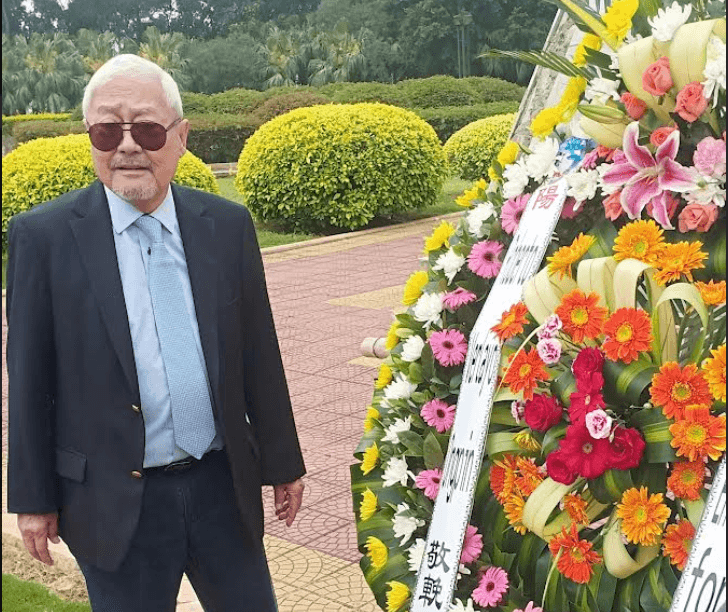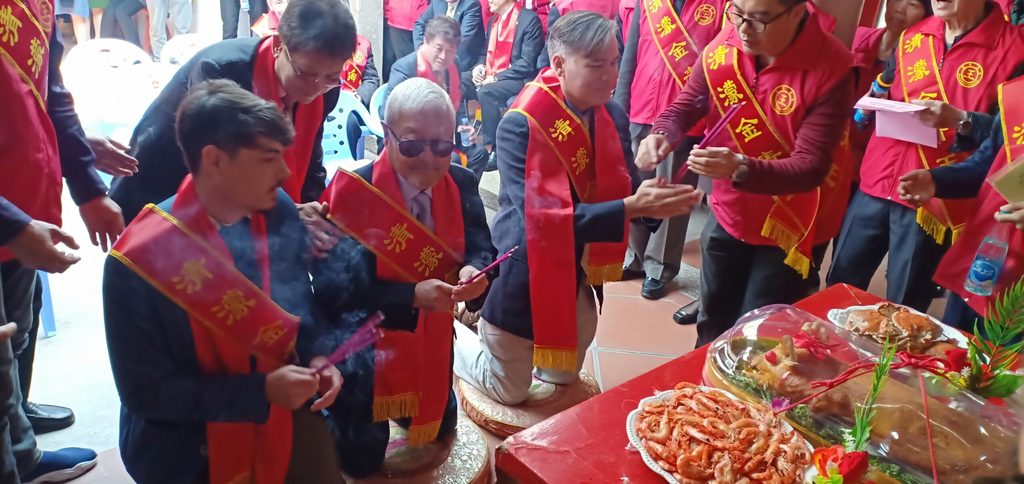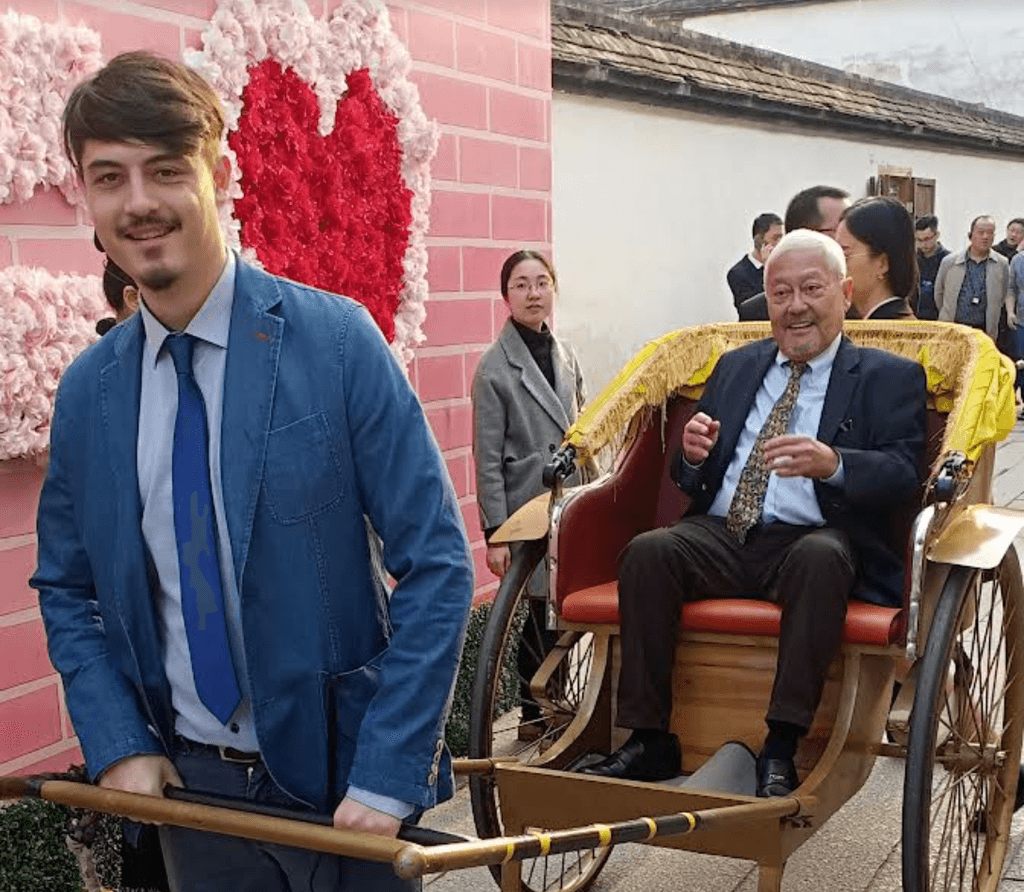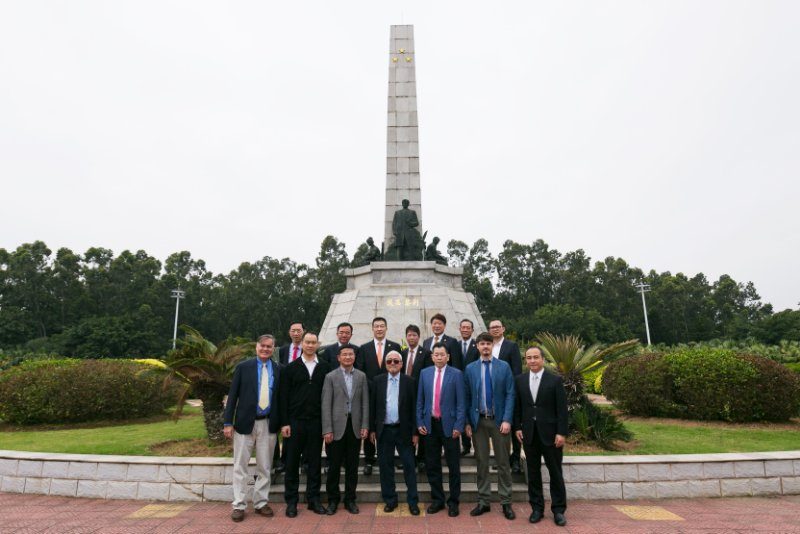SUMMARY
This is AI generated summarization, which may have errors. For context, always refer to the full article.

MANILA, Philippines – In 2019, the late businessman Roberto “Bobby” Ongpin visited China, not to seal another business deal, but to trace his ancestral roots.
For the first time, Ongpin, alongside his son Julian, nephew Rafael, and some business partners, flew to Jinjiang City in China’s Fujian province via his 12-seater, 3-engine Falcon 900 EX private jet.
Among his friends who arranged details of this sentimental journey were his Balesin Island Resort clients: realty investor Cesar Ching, Unitop retail chain founder Ricardo Brito, and Philippine Jinjiang General Association, Inc. director Marcelo Sy. Columnist and forum organizer Wilson Lee Flores also joined the trip to document Ongpin’s experience.

It was his late younger brother, former finance minister Jaime “Jimmy” Ongpin, who initiated the research on their ancestral roots in 1984. For Bobby, it was his duty to pick up from where his late brother left off and actually go pay a visit.
Flores, who has written about Tsinoys (Chinese-Filipinos and vice-versa) for decades, said that the billionaire felt strongly about the trip. Ongpin spoke neither Mandarin nor Hokkien, unlike some of the Tsinoy tycoons, so this trip helped him connect with his heritage. It was also one of the few moments where the tough-talking businessman loosened up a little, giving away some details of his personal life.

For instance, Flores was able to ask Bobby whether serving as trade minister of the late dictator Ferdinand E. Marcos, and Jimmy being a supporter of opposition leader Corazon Aquino, was a strategic and deliberate move during the latter years of the first Marcos administration.
“Was this similar to other prominent business and political clans with kin close to President Marcos, while other kin openly supported opposition leader and later President Cory Aquino?” Flores asked.
Ongpin shook his head: “Walang usapan (There was no arrangement), there was no such plan.”
Ongpin once made it clear that it was difficult for him to talk about his brother. In an ABS-CBN interview 12 years ago, he opened up about losing Jimmy to suicide.
“[I]t was not so easy for me to talk about this because he was in clinical depression. He was not happy. All I know is that I lost a brother,” Ongpin said in a rare TV appearance back in 2011.
Throughout the China trip, Ongpin felt he was at home. There, he took pride in his family and ancestors of Jose Rizal being from the same province.
Rizal’s immigrant paternal great-great-grandfather was Domingo Lamco, a self-made Chinese trader who lived in Zhang-Guo, a village near where Ongpin’s ancestors lived. There, he laid a wreath at the Rizal Monument to pay homage to Rizal.
“Never in my dreams have I imagined coming back to the ancestral village of my forebears and I am grateful for your warm welcome. It gives me great pleasure to also discover that the Philippine national hero Dr. Jose Rizal also traces his ancestral roots here in Jinjiang,” Ongpin said.

Ongpin and Marcos
Flores first met Ongpin when he was still a student journalist for Ateneo’s student publication, The Guidon.
“It was an advantage because I was able to introduce myself to the trade minister as Guidon’s managing editor. He was so proud and told me, ‘I (Ongpin) was sports editor. Let’s talk sometime!’” Flores told Rappler.
Years later, Flores was able to ask him some tough questions when he was already a working journalist, from details about Ongpin’s fallout with former business partner Willie Ocier, to issues about his role in the Marcos dictatorship.
“I think he had a good idea that he was among Marcos’ favorites. I would even describe him as one of the ‘deodorants’ of Marcos. He had good credentials, was the youngest chairman of SGV…he was the man who assured creditors that it was still good to do business in the Philippines despite all the political noise,” Flores said.
Ongpin, a Harvard MBA graduate, was initially not in Marcos’ close circles. When Marcos called him up in 1979 to be trade minister, he had several excuses to decline the job. At that time, Marcos was becoming unpopular and had to revamp his Cabinet.
In that rare television guesting on ABS-CBN, he cited his “complicated personal life” as one reason for the elder Marcos to not consider him for the job.
“It wasn’t that I didn’t want to be part of his Cabinet. I told him I had a very complicated personal life and that I felt I would bring embarrassment to his Cabinet. But he said, ‘I understand those things. They’re not a problem for me.’ We were supposed to talk for 15 minutes, but we talked for about three hours.”
Ongpin emphasized that it was a tough call to quit his post as managing partner of SGV, a post that entailed losing a hefty paycheck.
“I was managing partner of SGV from 1970 until 1979, when I was conscripted to government. It was a big sacrifice for me because the managing partners of SGV are probably the most highly compensated people in the business community here…. I was in private sector and was conscripted to government. The whole time was very difficult because I had to live off my capital,” he said.
When he did accept the post, he would go on to become one of Marcos’ favorite technocrats. Along with then-prime minister Cesar Virata, he helped steer the economy during the 1983 sovereign debt default following the August 21, 1983 assassination of opposition leader Benigno “Ninoy” Aquino Jr.
At a time when the country was short of dollars needed to pay imports, Ongpin created the Binondo “central bank.” He gathered foreign exchange dealers in Binondo and ordered them to sell only to the government all the dollars they could get from the black market. Ongpin dictated the exchange rate.
In his ABS-CBN interview, Ongpin recalled how he threatened these forex dealers.
The only way to make sure that we have dollars was to put fear into those black marketers. The president issued arrest and seizure orders for them. There were 8 of them.
Roberto Ongpin on the ‘binondo central bank’
“You cannot get these Chinese black marketers to follow your orders unless there’s a stick hanging over them. I let make them a profit of 40 cents per dollar. They have a whole market. They buy dollars and sell it to a center point and fly it to Hong Kong, and that would be the source for importers.”
After the People Power Revolt in 1986, Ongpin eased his way back into business circles.
Among the friendships he was able to foster was one with Malaysian tycoon Robert Kuok. Ongpin was able to convince Kuok to bring the Shangri-La brand to the Philippines. In 1992, the Shangri-La Hotel and mall opened in Mandaluyong.
Ongpin and journalists
Some of Ongpin’s business deals post-1986 would land him in the public eye. After all, some people thought he was a Marcos crony, a label he disliked considering he was one of the Marcos technocrats. He was also close to Jose Miguel “Mike” Arroyo, husband of former president Gloria Macapagal-Arroyo.
All of the entire time I was in the Cabinet was very difficult. I was under attack from a lot of sectors, principally his cronies. That’s why I resent being called a crony!
Roberto Ongpin
Among his business ventures was Alphaland, a high-end property developer. His signature project was the Balesin Island Club, an exclusive, multi-billion-dollar resort in Quezon province.
He also had interests in energy and telecommunications.
Although he was known as a no-nonsense technocrat during the Marcos years, he had to face allegations of engaging in shady business transactions in the latter years of his career.
Perhaps the most controversial and messy deal was exposed by business journalist Lala Rimando.
Rimando, who was then with the Lopez-led ABS-CBN News, detailed the multi-million lending and stock trading transactions between the Development Bank of the Philippines (DBP) and the companies associated with Ongpin. The DBP lendings were eventually dubbed “behest loans.”
Rimando, Rappler’s former head of business news, was a recipient of several Jaime V. Ongpin journalism awards, a distinction named after Bobby’s late brother.
Rimando first met Ongpin during a Senate hearing on the DBP controversy in 2011. He eventually invited her for lunch.
Rimando recalled that Ongpin did something of a “power play” on her, even showing her during a lengthy lunch meeting at the Alphaland building how “important” he was.
“In the case of Mr. Ongpin, he likes to bombard you with his points of view…. He didn’t like my report because he didn’t call it,” Rimando told ANC.
“He’s the type of tycoon who wants to do it his way, his timing, in a narrative that he himself shaped.”
In 2014, the Sandiganbayan junked the graft charges against Ongpin and former DBP officials.
Despite the hard-hitting piece about him, Rimando said Ongpin grew to respect her independent journalism.
Rimando was supposed to have a Zoom call with Ongpin on February 9 for her book about the late John Gokongwei. Ongpin was close to, and greatly admired, the late tycoon. That call never happened because Ongpin died in his sleep in his Balesin resort on February 5.
Another major controversy that hit Ongpin was when former president Rodrigo Duterte called him an oligarch and publicly threatened to destroy him.
“Ang plano talaga (The plan really) is, destroy the oligarchs that are embedded in government. ‘Yan sila (Those oligarchs), I’ll give you an example, publicly – Ongpin, Roberto,” said Duterte in August 2016, just over a month after assuming the presidency.
Amid the tirades, Ongpin resigned from gaming tech company PhilWeb. His daughter, Anna Bettina, also quit as the company’s vice chairperson and director.
Ongpin eventually sold his entire stake in PhilWeb to Gregorio “Greggy” Araneta, husband of former president Marcos’ daughter, Irene, for just P2 billion. Ongpin’s agreement with Araneta involved over 771 million shares, priced at P2.60 apiece. This was a big discount on the closing price of PhilWeb shares at that time of P6.22 each.
Ongpin would get linked to another controversy via his son Julian. Julian was arrested in September 2021 in connection with the death of his girlfriend, artist Bree Jonson, in an apparent suicide. Julian, then 29, tested positive for cocaine use and was criminally charged.
Jonson’s mother, Sally, feared they would not get justice since they were up against the son of a wealthy businessman. In an interview with ABS-CBN News, she asked the elder Ongpin not to use his power to influence the case.
Julian was released on bail despite the drug charge being non-bailable. Two months later, a local court cleared him of the drug charge.
With all the issues that hounded Ongpin, Flores described him as a “political survivor” who understood the “incestuous relationship” between politics and business.
“Many say he was difficult to deal with. He is brilliant, but has personality quirks. He was able to deal with differing views and interests…. Perhaps the most prime example was his relationship with his brother. I think, even though he and Jimmy had different politics, they remained close,” Flores said.
Last moments in Balesin
Ongpin spent his last moments in Balesin, his members-only luxury resort some 26 nautical miles off Quezon province.
The 450-hectare island was owned by his friend Ed Tordesillas, his former undersecretary at the ministry of trade and industry.
In a Facebook post of Rafael, Ongpin’s nephew, he said that on Tordesillas’ deathbed, he asked Ongpin to take over the development of the island.
“When it comes to property, Bobby Ongpin is obsessed with the details. He pores over floor plans, sketching out the revisions he wants. He wades through rooms full of samples, finishes, and swatches. He believes that substance is, precisely in these details. He insists that quality is not a perception created by marketeers, but an actual, tangible thing that customers respond to,” Rafael said.
Balesin opened in 2012. Ongpin gave club members occasional, but detailed updates.
His last entry was on January 10, 2023, where he told members that football games were now being played on the island’s FIFA-approved field. Ongpin said football had a special place in his heart, having played for the Ateneo varsity team “many moons ago.”
He also announced that a sea service between Mall of Asia in Pasay City and Sangley in Cavite City to Balesin would be available soon.
In August 2019, months after his trip to Fujian, he told club members that he would be putting up granite elephants in front of the clubhouse.
“When I visited Jin Jiang City in China’s Fujian province in March…I saw a magnificent granite elephant at the entrance of a seaside restaurant which we visited. Granite is actually indigenous to Fujian province, and the trading ships of centuries ago used to carry granite as ballast (we call it Piedra China). Ricardo Brito, the owner of Unitop, was gracious enough to send me a pair of these impressive granite elephants, each of which is about a meter and a half tall and weighs two tons. I have decided to put them on the lawn in front of the Clubhouse,” Ongpin said.
After his trip, he added more amenities and features to cater to Chinese taste, including villas built by “one of the most affluent entrepreneurs” from Shenzhen, as well as a Chinese restaurant.
Ongpin said in one of his entries that Balesin had become “somewhat of an obsession for me and where now I devote almost a third of my time.” He doted on his four grandchildren in his resort.
“Despite his obsession with detail, Ongpin is never satisfied – or he is careful not to show it. The closest he comes to revealing contentment is when he says, ‘This is what I really enjoy,'” Rafael said.
Ongpin, 86, is survived by his wife, Monica Arellano, and their children Stephen and Anna, as well as his two other kids, daughter Michelle, and son Julian. – Rappler.com
Add a comment
How does this make you feel?
![[New School] If you’re not Filipino or Chinese, well, what are you?](https://www.rappler.com/tachyon/2021/05/ispeak-chinoy-identity-1280.jpg?fit=449%2C449)
There are no comments yet. Add your comment to start the conversation.